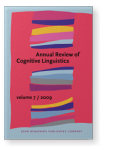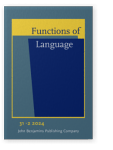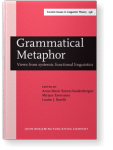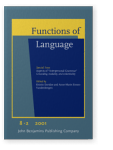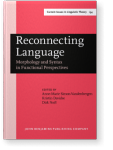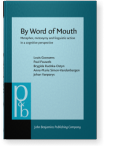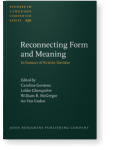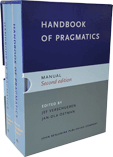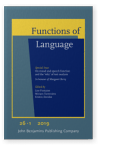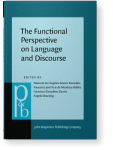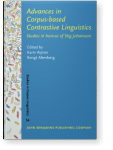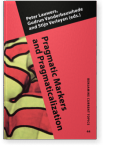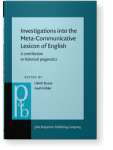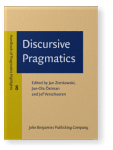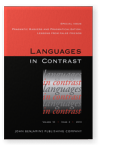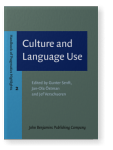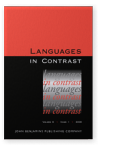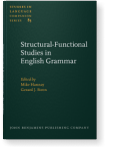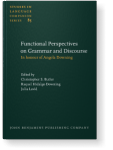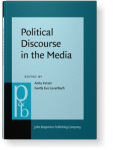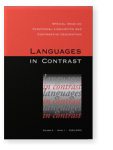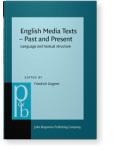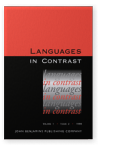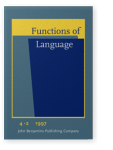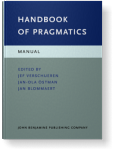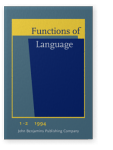Anne-Marie Simon-Vandenbergen
List of John Benjamins publications for which Anne-Marie Simon-Vandenbergen plays a role.
Yearbook
Journal
ISSN 0929-998X | E-ISSN 1569-9765
Grammatical Metaphor: Views from systemic functional linguistics
Edited by Anne-Marie Simon-Vandenbergen, Miriam Taverniers and Louise J. Ravelli
[Current Issues in Linguistic Theory, 236] 2003. vi, 453 pp.
Subjects Functional linguistics | Germanic linguistics | Theoretical linguistics
Aspects of “Interpersonal Grammar”: Grounding, modality, and evidentiality
Edited by Kristin Davidse and Anne-Marie Simon-Vandenbergen
Special issue of Functions of Language 8:2 (2001) iv, 154 pp.
Subjects Functional linguistics | Pragmatics
Reconnecting Language: Morphology and Syntax in Functional Perspectives
Edited by Anne-Marie Simon-Vandenbergen, Kristin Davidse and Dirk Noël
[Current Issues in Linguistic Theory, 154] 1997. xiii, 339 pp.
Subjects Functional linguistics | Morphology | Syntax
By Word of Mouth: Metaphor, metonymy and linguistic action in a cognitive perspective
Louis Goossens, Paul Pauwels, Brygida Rudzka-Ostyn, Anne-Marie Simon-Vandenbergen and Johan Vanparys
[Pragmatics & Beyond New Series, 33] 1995. xii, 254 pp.
Subjects Cognition and language | Pragmatics
2023 Chapter 6. The compound pronouns someone / somebody and everyone / everybody in present-day spoken English: An analysis based on the Spoken BNC2014 corpus Reconnecting Form and Meaning: In honour of Kristin Davidse, Gentens, Caroline, Lobke Ghesquière, William B. McGregor and An Van linden (eds.), pp. 145–182 | Chapter
This article builds on previous research on the compound pronoun sets somebody/someone and everybody/everyone to test the hypotheses that the -one and -body forms are semantically identical, but that stylistic and social factors play a role in their relative frequencies. Earlier findings are… read more
2022 Firthian linguistics Handbook of Pragmatics: Manual, Verschueren, Jef and Jan-Ola Östman (eds.), pp. 558–562 | Chapter
2019 Reflections on Functions of Language On mood and speech function and the ‘why’ of text analysis: In honour of Margaret Berry, Fontaine, Lise, Miriam Taverniers and Kristin Davidse (eds.), pp. 13–14 | Miscellaneous
2019 Do we need more of the same? Some reflections on text analytical research On mood and speech function and the ‘why’ of text analysis: In honour of Margaret Berry, Fontaine, Lise, Miriam Taverniers and Kristin Davidse (eds.), pp. 49–55 | Article
2014 The adverb truly in Present-Day English The Functional Perspective on Language and Discourse: Applications and implications, Gómez González, María de los Ángeles, Francisco José Ruiz de Mendoza Ibáñez, Francisco Gonzálvez-García and Angela Downing (eds.), pp. 169–186 | Article
In comparison with the semantically and pragmatically related adverbs really,
actually and in fact, the adverb truly has been studied much less extensively.
One reason for the neglect may be its relatively low frequency. This is obvious if
one consults the British National Corpus (BNC). This… read more
2013 English adverbs of essence and their equivalents in Dutch and French Advances in Corpus-based Contrastive Linguistics: Studies in honour of Stig Johansson, Aijmer, Karin and Bengt Altenberg (eds.), pp. 83–102 | Article
The adverbs basically, essentially and fundamentally are here referred to as ‘adverbs of essence’. Butler (2008a, 2008b, 2008c) has studied these adverbs and their formal equivalents in four Romance languages in monolingual corpora. This article takes a translation perspective and zooms in on the… read more
2012 Degrees of pragmaticalization: The divergent histories of ‘actually’ and actuellement Pragmatic Markers and Pragmaticalization: Lessons from false friends, Lauwers, Peter, Gudrun Vanderbauwhede and Stijn Verleyen (eds.), pp. 37–64 | Article
Despite their formal resemblance, the English word ‘actually’ and the French word actuellement fulfil very different semantic-pragmatic functions in their present-day usage. In most cases they are ‘false friends’, as they overlap in meaning in a very limited number of contexts only. Since these… read more
2012 Verbs of answering revisited: A corpus-based study of their pragmatic development Investigations into the Meta-Communicative Lexicon of English: A contribution to historical pragmatics, Busse, Ulrich and Axel Hübler (eds.), pp. 223–246 | Article
2011 Pragmatic markers Discursive Pragmatics, Zienkowski, Jan, Jan-Ola Östman and Jef Verschueren (eds.), pp. 223–247 | Article
2010 Degrees of pragmaticalization: The divergent histories of ‘actually’ and actuellement Pragmatic Markers and Pragmaticalization: Lessons from false friends, Lauwers, Peter, Gudrun Vanderbauwhede and Stijn Verleyen (eds.), pp. 166–193 | Article
Despite their formal resemblance, the English word ‘actually’ and the French word actuellement fulfil very different semantic-pragmatic functions in their present-day usage. In most cases they are ‘false friends’, as they overlap in meaning in a very limited number of contexts only. Since these… read more
2009 Pragmatic markers Handbook of Pragmatics: 2009 Installment, Östman, Jan-Ola and Jef Verschueren (eds.), pp. 1–29 | Article
2009 Firthian linguistics Culture and Language Use, Senft, Gunter, Jan-Ola Östman and Jef Verschueren (eds.), pp. 140–145 | Article
2007 No doubt and related expressions: A functional account Structural-Functional Studies in English Grammar: In honour of Lachlan Mackenzie, Hannay, Mike and Gerard J. Steen (eds.), pp. 9–34 | Article
The epistemic adverb no doubt refers literally to absence of doubt, and hence to complete certainty, but it is actually described in the literature as expressing less than full certitude and as more or less synonymous with ‘very probably’. This contribution uses corpus data to examine the meaning… read more
2007 The discourse functionality of adjectival and adverbial epistemic expressions: Evidence from present-day English Functional Perspectives on Grammar and Discourse: In honour of Angela Downing, Butler, Christopher S., Raquel Hidalgo Downing and Julia Lavid-López (eds.), pp. 419–446 | Article
In this article we examine the adjectival and adverbial expressions it is certain/certainly, it is clear/clearly and it is obvious/obviously in a corpus of present-day English, the British National Corpus. We aim to answer two questions. One is the question of how the constructional properties of… read more
2007 Presupposition and ‘taking-for-granted’ in mass communicated political argument. An illustration from British, Flemish and Swedish political colloquy Political Discourse in the Media: Cross-cultural perspectives, Fetzer, Anita and Gerda Eva Lauerbach (eds.), pp. 31–74 | Article
2004 The expectation marker of course in a cross-linguistic perspective Functional Linguistics and Contrastive Description, Davidse, Kristin and Liesbet Heyvaert (eds.), pp. 13–43 | Article
The study of of course presented in this article has an applied, a descriptive and a theoretical aim. Since of course proves to be very frequent in English, learners will need to know what meanings the item has and in what pragmatic contexts it is used. It has indeed been shown that some learners… read more
2003 Lexical metaphor and interpersonal meaning Grammatical Metaphor: Views from systemic functional linguistics, Simon-Vandenbergen, Anne-Marie, Miriam Taverniers and Louise J. Ravelli (eds.), pp. 223–255 | Article
2000 11. Towards an Analysis of Interpersonal Meaning in Daytime Talk Shows English Media Texts – Past and Present: Language and textual structure, Ungerer, Friedrich (ed.), pp. 217–240 | Chapter
1998 Introduction Languages in Contrast 1:2, pp. v–xi | Miscellaneous
1997 Carita Paradis. Degree Modifiers of Adjectives in Spoken British English Functions of Language 4:2, pp. 312–314 | To be specified
1995 Body Parts in Linguistic Action: Underlying Schemata and Value Judgements By Word of Mouth: Metaphor, metonymy and linguistic action in a cognitive perspective, Goossens, Louis, Paul Pauwels, Brygida Rudzka-Ostyn, Anne-Marie Simon-Vandenbergen and Johan Vanparys, pp. 35–70 | Article
1995 Assessing Linguistic Behaviour: A Study of Value Judgements By Word of Mouth: Metaphor, metonymy and linguistic action in a cognitive perspective, Goossens, Louis, Paul Pauwels, Brygida Rudzka-Ostyn, Anne-Marie Simon-Vandenbergen and Johan Vanparys, pp. 71–124 | Article
1995 Firthian linguistics Handbook of Pragmatics: Manual, Verschueren, Jef, Jan-Ola Östman and Jan Blommaert † (eds.), pp. 278–282 | Article
1994 Angela Downing and Philip Locke. A University Course in English Grammar Functions of Language 1:2, pp. 311–312 | To be specified
